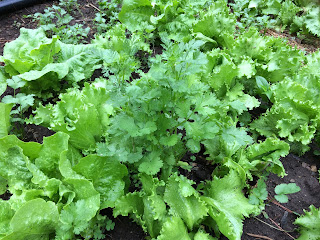 |
| My neighbor Ellie Fisher and her boys with a load of soil. |
Question: Hi Lisa! We have a small garden area, maybe 4'x6’, where I can plant vegetables. I do not have a green thumb so haven't had a lot of luck over the years, but want to give it a go again this year. What do you recommend for getting the soil ready to plant? What should we add to it and should we test it in some way first? Thank you :-)
Regards,
Ellen
Answer: Hi Ellen! Where to begin? There are a range of approaches to getting the soil ready for a new garden, from not doing much at all to testing the soil you have and amending it if necessary. You can also bring in new soil.





